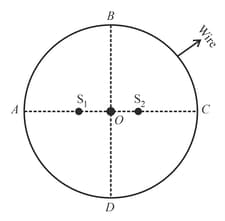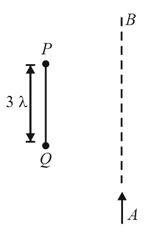Level 2
Important Questions on Level 2
A parallel beam of fast moving electrons is incident normally on a narrow slit. A fluorescent screen is placed at a large distance from the slit. If the speed of the electrons is increased, then which of the following statements is correct?
In Young's double slit experiment, if the distance between two slits is equal to the wavelength of used light. Then the maximum number of bright fringes obtained on the screen will be
The shape of wave front at a very large distance from source is ________.
In interference experiment, intensity at a point is of the maximum intensity. The angular position of this point is at ( wavelength of light, slitwidth)
Two polaroids are placed to each other and the transmitted intensity is zero. One more polaroid is placed between them bisecting the angle between them. Let be the intensity of light just after the first polaroid. The fraction of I transmitted by the system is-
Newton's rings are observed normally in reflected light of wavelength . The diameter of the dark ring is . The radius of curvature of the lens is
In a Fraunhofer diffraction at a single slit, if yellow light illuminating the slit is replaced by blue light, then diffraction bands
Assume that the light of wavelength is coming from a star. What is the resolution limit of a telescope whose objective has a diameter of inch?
In Young's double slit experiment using monochromatic light of wavelength , the intensity of light at a point on the screen where path difference is , is units. The intensity of light at a point, where path difference is is
A Young double slit experimental setup is immersed in water of refractive index It has slit separation and the distance between slits and screen is . If the wavelength of incident light on slits is then the fringe width on screen is
Two point sources and separated by a distance emit light waves of wavelength in phase. A circular wire of radius is placed around the sources as shown in figure, then ( is the centre of the circle and )

A Fraunhofer diffraction pattern due to a single slit of width is obtained on a screen placed at a distance of from the slit. The first minima lie at on either side of the central maximum on the screen. The wavelength of light used is
The resolution limit of eye is At a distance from the eye two persons stand with a lateral separation of For the two persons to be just resolved by the naked eye, should be,
Two coherent light sources each of wavelength are separated by a distance . The maximum number of minima formed on line AB which runs from to is:

Two monochromatic light waves are travelling with same frequency and constant phase difference. If both waves interfere, then
In the ideal double-slit experiment, when a glass-plate (refractive index ) of thickness is introduced in the path of one of the interfering beams (wavelength ), the intensity at the position where the central maximum occurred previously remains unchanged. The minimum thickness of the glass plate is
By Huygens wave theory of light, we cannot explain the phenomenon of
Unpolarised light is incident from air on a plane surface of a material of refractive index . At a particular angle of incidence , it is found that the reflected and refracted rays are perpendicular to each other. Which of the following options is correct for this situation?
Assertion: A spherical wavefront is produced by a point source of light.
Reason: It is because, the locus of all points, which are equidistant from the point source, is a sphere.

